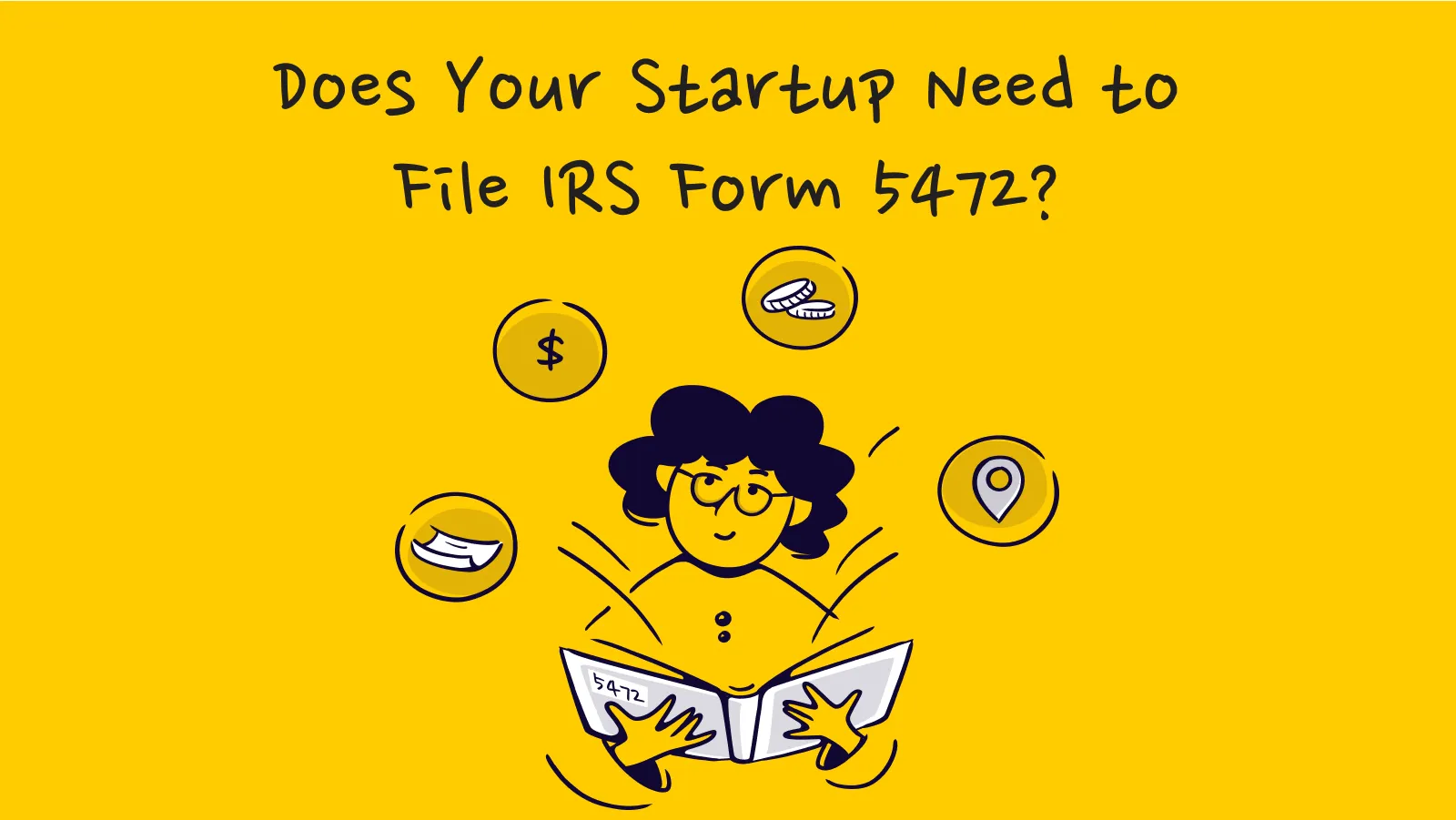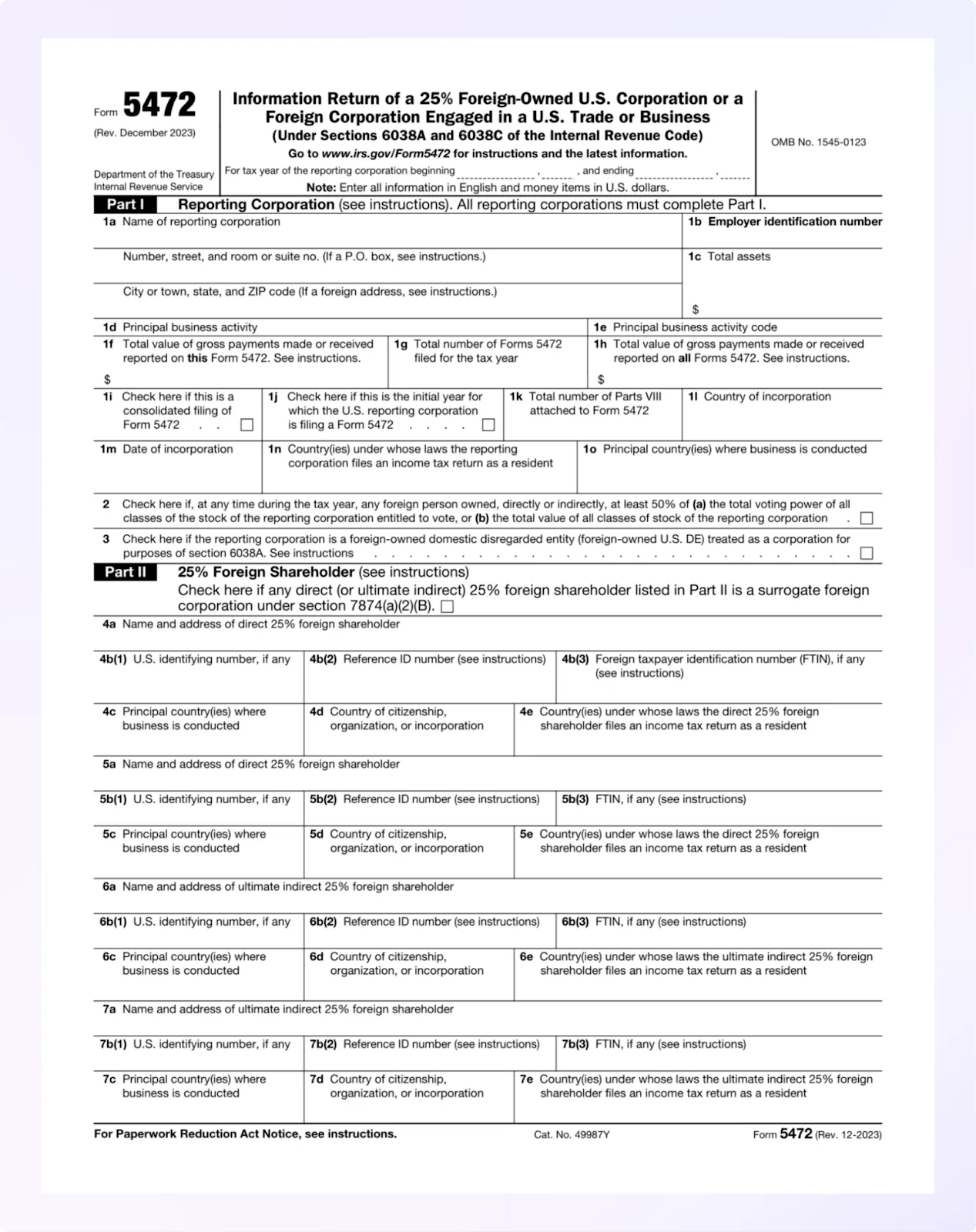Does Your Startup Need to File IRS Form 5472?

If your US-based startup has foreign ownership, even as little as one share or engages in any qualifying transaction with a foreign-related party, you may be required to file IRS Form 5472.
Failing to do so can lead to severe penalties, starting at $25,000 and increasing the longer you stay non-compliant.
Form 5472 is an informational filing that tells the IRS about your cross-border relationships and transactions. This guide explains who must file, what counts as a reportable transaction, and how to stay compliant as a foreign-owned US corporation or disregarded entity.
What Is IRS Form 5472? Why Is It Important?

Form 5472 is an IRS information return used to report transactions between a US entity and its foreign-related parties. It applies to US corporations with significant foreign ownership and to disregarded entities (like single-member LLCs) owned by foreign persons.
The form captures details of intercompany transactions, including payments, contributions, and service arrangements.
The IRS uses Form 5472 to prevent tax avoidance, monitor foreign influence in US businesses, and enforce transparency in cross-border dealings.
Filing is not optional. Failure to file or filing incomplete information can trigger steep penalties and extended audit exposure.
Here’s why Form 5472 matters for startups:
- It is mandatory if your startup has 25% or more foreign ownership or is a foreign-owned LLC.
- Even one cross-border transaction (monetary or not) can trigger the requirement.
- Non-compliance can lead to a $25,000+ penalty and open the door to deeper IRS scrutiny.
- Filing correctly and on time builds trust with US regulators and investors.
Who Needs to File Form 5472?
If your startup has any level of foreign ownership or involvement in cross-border transactions, it’s worth checking whether you fall under the filing requirements.
Below are the main categories of entities that must file, and what exactly triggers the obligation.
1. US Corporations with 25% or More Foreign Ownership
If a foreign person or entity owns at least 25% of the voting power or value of a US corporation, the company must file Form 5472. This applies even if the company is a startup or hasn’t generated revenue yet.
What triggers it: Any transaction with the foreign owner or a related foreign party such as capital contributions, loans, or service payments.
2. Foreign Corporations Engaged in a US Trade or Business
Foreign corporations operating in the US through a branch, sales office, or service contract must file Form 5472 if they have transactions connected to their US activities.
What triggers it: Any income-generating activity or related-party transaction within US borders (e.g., sales, services, or licensing agreements).
3. Foreign-Owned Disregarded Entities (e.g., Single-Member LLCs)
If a disregarded US entity like a single-member LLC is owned by a foreign person, it’s treated as a “reporting entity” and must file Form 5472 with a pro forma Form 1120.
What triggers it: Even one reportable transaction during the year (monetary or non-monetary) can require filing.
What Triggers the Requirement to File?
Form 5472 isn’t triggered by revenue thresholds, instead it’s triggered by transactions.
Even a single transaction between a US entity and a related foreign party can require filing. This includes both financial and non-financial exchanges, whether or not money changed hands.
Startups often assume they’re exempt if they haven’t made sales yet. But that’s not how the IRS sees it. A capital contribution from a foreign founder, a management fee paid to a foreign parent, or a loan from a foreign investor all count as reportable transactions under Form 5472.
Common reportable transactions include:
- Selling or purchasing goods or services between the US entity and a foreign parent, investor, or affiliate.
- Issuing or receiving loans across borders, including any interest payments or loan repayments.
- Paying royalties, rent, or licensing fees to a foreign individual or entity for intellectual property or leased assets.
- Receiving a capital contribution from a foreign owner or distributing dividends to a foreign shareholder.
- Entering into any intercompany transaction (financial or non-financial) that alters the income, equity, or asset position of the US business.
How and When Should Startups File Form 5472?
Form 5472 must be attached to a corporate tax return. For US corporations with foreign ownership, this means including Form 5472 with Form 1120. For foreign-owned disregarded entities (like single-member LLCs), it must be filed with a pro forma Form 1120, even if the entity has no US income or tax due.
The deadline to file is March 15 each year (for calendar-year entities), aligning with the due date of the corporate return. If your startup requests an extension using Form 7004, the deadline moves to October 15. Late filing, even by one day, can trigger the $25,000 penalty.
Here the form 5472 filing instructions for startups:-
- Confirm whether your startup has 25% or more foreign ownership.
- Review the year’s activity for any reportable transactions with foreign-related parties.
- Prepare Form 5472 and ensure it is attached to Form 1120 or a pro forma Form 1120.
- File by March 15, or file Form 7004 in advance to extend the deadline to October 15.
- Keep detailed documentation for each transaction in case of an IRS audit.
What Are the Penalties for Not Filing or Filing Incorrectly?
The IRS takes Form 5472 compliance seriously.
If your startup fails to file the form on time, omits required information, or submits an incomplete version, you’ll face an automatic penalty of $25,000 per violation. This applies even if the mistake was unintentional.
Worse, if the IRS notifies you of the issue and you still don’t correct it within 30 days, an additional $25,000 can be assessed for every 30-day period the issue remains unresolved.
There’s no official cap on how much these penalties can grow, and non-compliance could trigger extended audit windows or scrutiny of other filings.
Here’s how the penalty structure for non/incorrect filing of form 5472:-
- A $25,000 penalty applies for failing to file, filing late, or submitting an incomplete or incorrect Form 5472.
- An additional $25,000 is charged for every 30 days the issue isn’t corrected after an IRS notice.
- There is no upper limit. Penalties can keep increasing until you comply.
- Non-compliance may result in a broader IRS audit of your company’s records.
- The IRS can also make income adjustments that increase your tax liability or result in legal consequences.
What’s the Difference Between Form 5471 and 5472?
Form 5471 and Form 5472 are often confused, but they serve opposite purposes depending on the direction of foreign ownership. If a US person owns a foreign corporation, they may need to file Form 5471. If a foreign person owns part or all of a US entity, Form 5472 applies.
Both forms are used for international tax compliance and transparency, but they report different types of information to the IRS. Knowing which form applies helps avoid filing the wrong return, or missing one entirely.
Here are the key differences between Form 5471 and Form 5472:-
How Inkle Helps Startups File Form 5472
Inkle helps global founders and India–US startups navigate these requirements with built-in workflows, deadline tracking, and expert guidance tailored for cross-border businesses.
With Inkle, you can:
- Identify whether your startup triggers a Form 5472 filing based on ownership and transaction history
- Prepare and file Form 5472 accurately, along with the required pro forma Form 1120
- Maintain audit-ready documentation and transaction logs throughout the year
- Avoid penalties with automatic filing reminders and deadline monitoring
- Access expert support for US–India tax and entity structuring questions
Book a demo with Inkle and stay ahead of your cross-border compliance.
Frequently Asked Questions
What is IRS Form 5472?
IRS Form 5472 is an informational return used to report transactions between a US entity and its foreign-related parties. It’s designed to promote transparency and prevent tax avoidance in cross-border dealings.
Who needs to file Form 5472?
US corporations with 25% or more foreign ownership, foreign-owned disregarded entities (like single-member LLCs), and foreign corporations conducting US business must file Form 5472.
Do I need to file if I had only one transaction?
Yes. Even a single reportable transaction such as a capital contribution, loan, or service payment triggers the filing requirement, regardless of the amount involved.
What happens if I forget to file Form 5472?
You’ll face a minimum $25,000 penalty. If you don’t fix the issue within 30 days of an IRS notice, additional $25,000 penalties apply for each month of non-compliance.
How is Form 5472 different from Form 5471?
Form 5472 applies to foreign ownership of US entities and focuses on reportable transactions. Form 5471 is for US persons who own or control foreign corporations and reports equity and control information.
Can Inkle help with Form 5472 compliance?
Yes. Inkle offers automated filing, deadline tracking, transaction audits, and expert support to help startups stay compliant with IRS Form 5472 and related cross-border filings.



